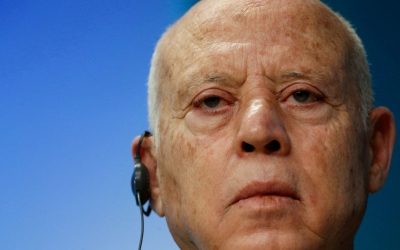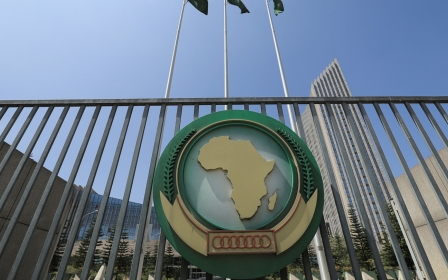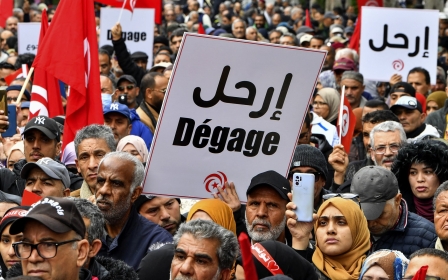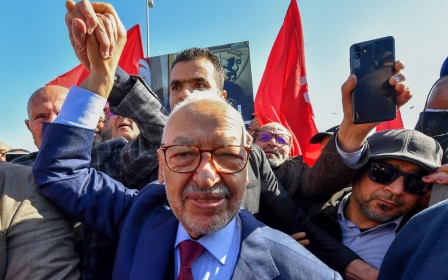Tunisia: Free press under attack as President Kais Saied tightens grip
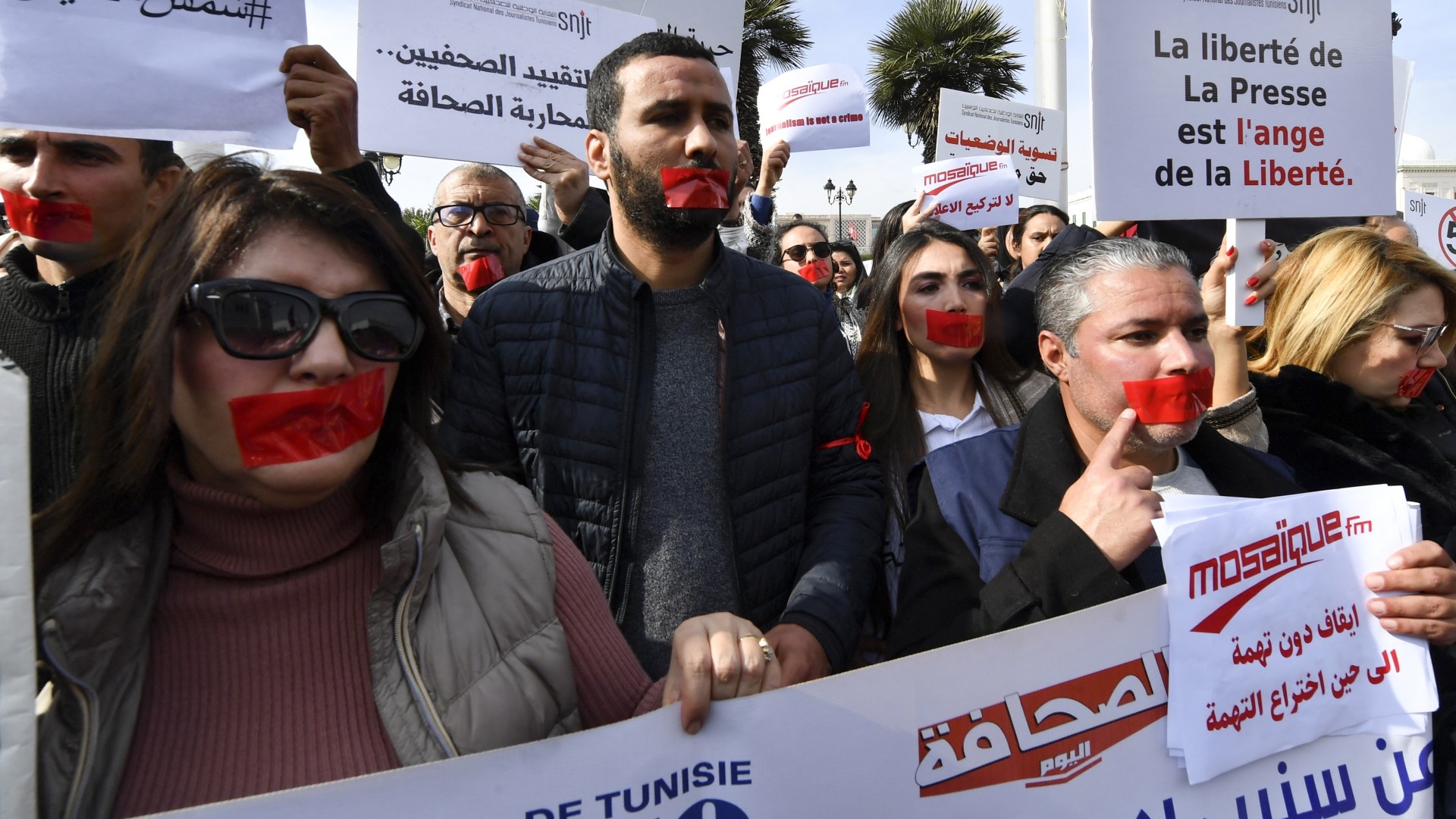
When the Tunisian revolution took hold in January 2011, after decades of restraint and repression, the media's freedom to criticise and scrutinise was suddenly unleashed.
"It was an explosion really. The private sector was loaded with different media outlets, including new TV channels and new online papers," Strasbourg-based Tunisian journalist Amine Snoussi tells Middle East Eye.
"Every major TV channel had political shows that were very aggressive towards all powers."
Fadil Aliriza, journalist and editor of independent Tunisian news site Meshkal, felt that newfound openness too, after the overthrow of longtime authoritarian ruler Zine El Abidine Ben Ali.
'The aim of this trial is to intimidate me... and other activists who champion the truth'
- Mohamed Mehdi Jelassi, Tunisian Journalists Syndicate
"Press freedom blossomed after 2011," he tells MEE. "There were certainly still many problems like media barons' involvement in politics and continuing police repression, especially in rural areas, but there was much more space for free press."
New MEE newsletter: Jerusalem Dispatch
Sign up to get the latest insights and analysis on Israel-Palestine, alongside Turkey Unpacked and other MEE newsletters
Fast-forward a decade, as Tunisian President Kais Saied persists with an ongoing power grab, and those hard-fought freedoms are coming under increasing threat.
Last week, police raided the home of Noureddine Boutar, the head of Mosaique FM, one of Tunisia's largest and most popular independent radio stations.
He faces money laundering and "illicit enrichment" charges, but his detainment has been denounced as an attempt to intimidate journalists critical of the government.
Mohamed Mehdi Jelassi, the head of Tunisia’s Journalists Syndicate (SNJT), announced on Tuesday that a criminal investigation had been launched against him over his coverage of a July 2022 protest against Tunisia's recent constitutional referendum.
"The aim of this trial is to intimidate me," Jelassi told MEE. "And also [to] intimidate other activists who champion the truth and defend the freedom of media and expression."
"The real issue has nothing to do with the rule of law; it's an attempt to punish activists."
The targeting of the union chief was condemned by international press collectives.
The International Federation of Journalists called it an "unjustified attack on one of [our] member unions", and said it was considering filing a complaint against the Tunisian government to the International Labour Organisation.
Sherif Mansour, the Committee to Protect Journalists' Middle East and North Africa programme coordinator told MEE: "Tunisian authorities must stop their judicial harassment of journalist Mohamed Mehdi Jlassi and withdraw the unsubstantiated police complaint against him.
"Prosecuting journalists on charges unrelated to journalism is clear intimidation."
MEE reached out to the Tunisian presidency about the recent targeting of journalists, but did not hear back by the time of publication.
Climate of fear
Tunisia has been engulfed in political and economic crises since July 2021, when Saied unilaterally suspended parliament and dissolved the government in what has been dubbed a "constitutional coup".
He subsequently ruled by decree, before pushing through a new constitution that enshrined his one-man rule.
The power grab is increasingly impacting many institutions and areas of civil society: from the judiciary, to anti-racism and trade unionism. The media is not being spared.
There has been a marked increase in journalists being arrested or intimidated since Saeid's power grab, according to a report last year by the CPJ, the SNJT and the Tahrir Institute for Middle East Policy.
'When pitching an idea, you get second thoughts. This fear is a way to limit freedom itself'
- Amine Snoussi, journalist
It found that at least nine journalists had been harassed and assaulted by protesters or security forces during demonstrations in the days after the July 2021 power grab began.
It also documented occasions when security forces, under orders from the Tunisian interior ministry, attacked newsrooms, including raiding Al Jazeera's offices in July 2021 and storming the broadcast rooms of Tunisian public television in January last year.
A report from EuroMed Monitor in May also found similar violations against journalists, including harassment, smear campaigns on social media and arbitrary detention.
It noted a noticeable targeting of female journalists, through intimidation, psychological intimidation and threats.
"When you see journalists being arrested, you get second thoughts," said Snoussi. "When pitching an idea, you get second thoughts. This fear is a way to limit freedom itself."
Aliriza said that the situation had "deteriorated" over the past two years, "especially as security forces feel more empowered now to repress critics".
Saied issued a presidential decree in September that imposed prison terms of up to 10 years for the vague charge of "spreading false information or rumours online". The move was immediately viewed as an assault on freedom of speech.
For Snoussi, who left Tunisia to continue his studies in Strasbourg, he now does not know whether he can return.
"I hope I can come back one day. But now, in this situation, as a journalist and critic of the government, I know I can be put in jail. I seriously don't want that to happen to my family."
This article is available in French on Middle East Eye French edition.
Middle East Eye delivers independent and unrivalled coverage and analysis of the Middle East, North Africa and beyond. To learn more about republishing this content and the associated fees, please fill out this form. More about MEE can be found here.


